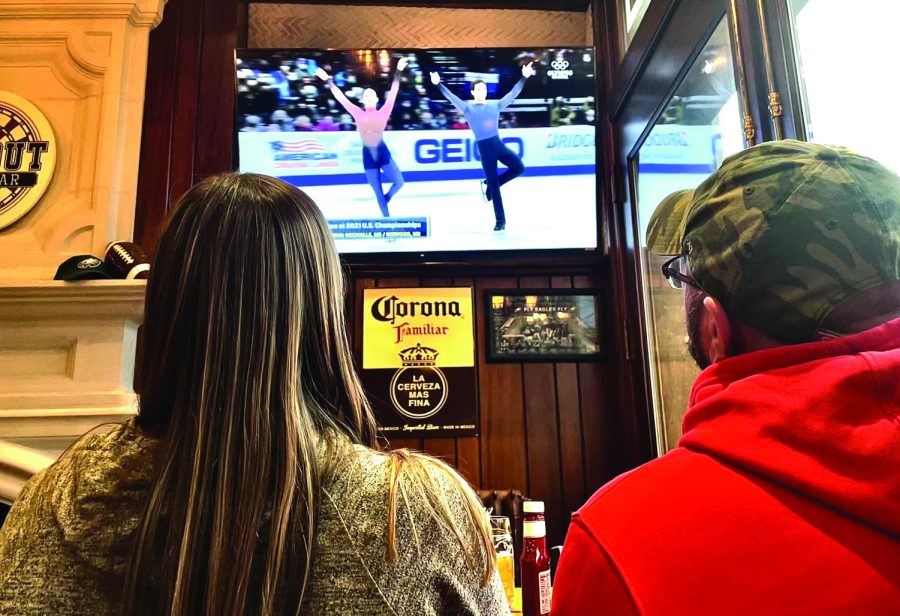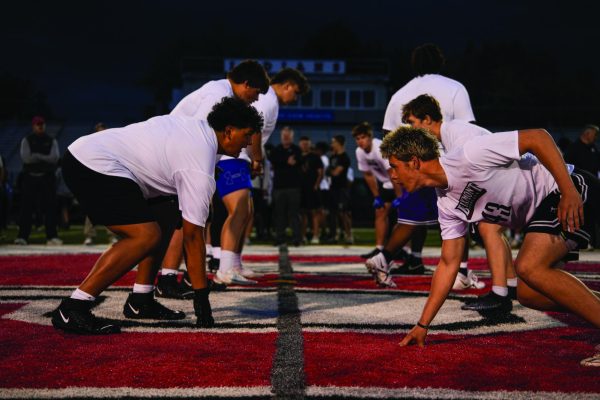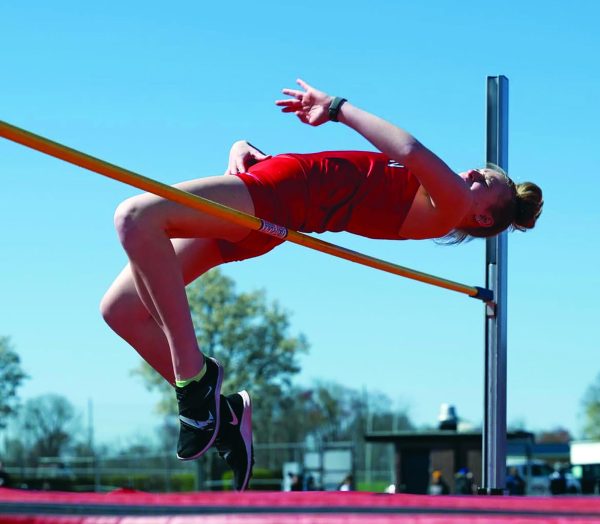Teens show declining interest in Olympics
By shifting the focus of the Olympics from the sports themselves to athletes’ personal lives, some viewers have lost interest in the events.
Winter watchers…Watching the Olympic channel at Timeout Sports Bar, Katie Townsend (left) and Brian Curry observe U.S. ice dancers Caroline Green and Michael Parsons compete at the 2022 Winter Olympics in Beijing, China.
Due to a lack of advertising to younger generations and technology which distracts people from sports, many teens are losing interest in the Olympic Games.
Often parents of older generations talk about Olympic drama and success stories from their youth.
Former track coach Mike Feliciani, a Generation Xer, describes the Olympics as “literally the most exciting thing going on” when he was a kid. “I just remember it was like the Fourth of July, but every day for three weeks,” Feliciani said.
Feliciani tries to take in as much track and field as he can during the Summer Olympics.
Despite his enjoyment of the Olympics, Feliciani feels as though they have changed for the worse over the years.
He feels as though the Olympics have put too much focus on the athletes’ lives rather than the sport.
“The coverage has turned from just embracing sport and the drama that sport can bring and it’s turned into this whole production of human interest stories,” Feliciani said. “It’s just human interest story after human interest story and it’s almost like the sport is gone and it’s just about someone’s life story somebody thinks people are going to find interesting.”
Sophomore Michael Rebuck said he has never sat down before with the intention of turning on and watching the Olympics.
Rebuck pins his lack of team sport experience and the minimal amount of advertising towards younger demographics for the Olympics as a contributor to his little interest.
“As a kid growing up, I liked sports but never was given the opportunity to play them so I never got into them that much, but I feel like the U.S. doesn’t hype them up that much, especially to kids,” Rebuck said. “I feel like only adults who are ex-athletes really care.”
Rebuck thinks people have lost interest in the Olympics since he was younger, and he especially notices the difference among teens, specifically teens with social media.
“I can’t speak for everyone, but they just seem so boring. I think that’s the case for most teens, at least. Why would I want to watch some people run when I can scroll on Tik Tok?” Rebuck said.
Telford resident Mary Mushinski, a Baby Boomer, says the Olympics, or athletics in general, were never too important to her.
She knows they were for some, but just not her personally.
Mushinski acknowledges the drastic advancements the world has as far as technology and describes it as a main contributor to any interest lost in the Olympics.
“Teens all use technology to entertain themselves [too] much to even realize what’s happening around them,” Mushinski said.
Mushinkski also believes the lack of local recognition could be an issue. She describes it as “not having your team to root for.”
Mushinski thinks that could be the point where teens lose their passion for professional sports.
Student-athlete Margaret Donnelly says she hasn’t sat down to watch the Olympics in a few years now.
“The last time I really watched the Olympics was in summer 2016,” Donnelly said. “I usually watch figure skating or gymnastics when I sit down, though.”
Donnelly believes that the Olympics aren’t as popular right now over all age groups, not to any fault of their production or technology, but rather current events.
“I don’t think they’ve lost their hype. I just think people are more concerned about other things, such as COVID, in recent years,” Donnelly said.





